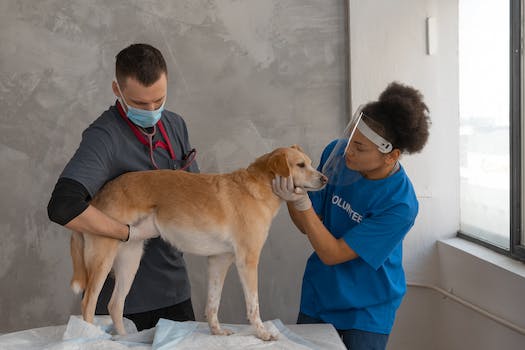

-
Table of Contents
Rescued Animals Saving Lives: Unleashing Hope, One Life at a Time.
Introduction
Rescued Animals Saving Lives is a concept that highlights the incredible impact that animals, who have been saved from various difficult situations, can have on human lives. These animals, often adopted from shelters or rescue organizations, go on to become therapy animals, service animals, or even heroes in their own right. Through their unconditional love, support, and unique abilities, these rescued animals bring joy, comfort, and sometimes even save lives.
The Impact of Rescued Animals on Mental Health
Rescued Animals Saving Lives
The Impact of Rescued Animals on Mental Health
In today's fast-paced and stressful world, mental health issues have become increasingly prevalent. Many individuals struggle with anxiety, depression, and other mental health disorders, seeking solace and support in various forms. One surprising source of comfort and healing comes from rescued animals. These animals, who have often experienced their fair share of trauma and hardship, have a remarkable ability to positively impact the mental health of their human companions.
One of the key ways in which rescued animals contribute to improved mental health is through the provision of unconditional love and companionship. For individuals battling loneliness or feelings of isolation, the presence of a rescued animal can be transformative. These animals offer a non-judgmental and unwavering source of support, providing a sense of belonging and purpose. The simple act of petting a dog or cuddling a cat can release endorphins, promoting feelings of happiness and reducing stress levels.
Moreover, rescued animals have a unique ability to empathize with their human counterparts. Having experienced their own share of trauma and adversity, they possess an innate understanding of pain and suffering. This empathy can be incredibly comforting for individuals struggling with mental health issues. The presence of a rescued animal can create a safe space for emotional expression, allowing individuals to open up and share their feelings without fear of judgment. This emotional connection can be profoundly healing, providing a sense of validation and understanding that is often lacking in other relationships.
In addition to emotional support, rescued animals also encourage physical activity and social interaction. Many individuals with mental health disorders struggle with motivation and find it challenging to engage in regular exercise or socialize with others. However, the responsibility of caring for a rescued animal can provide the necessary motivation to get out of the house and engage in physical activity. Whether it's taking a dog for a walk or playing with a cat, these activities not only benefit the animal but also promote physical well-being and release endorphins in humans.
Furthermore, rescued animals can act as a bridge to social interaction. Walking a dog in the park or attending training classes can lead to chance encounters and conversations with other pet owners, fostering a sense of community and connection. For individuals who find it difficult to initiate social interactions, the presence of a rescued animal can serve as a conversation starter, breaking down barriers and facilitating meaningful connections.
It is important to note that the impact of rescued animals on mental health is not limited to individuals with diagnosed mental health disorders. The therapeutic benefits of these animals extend to individuals experiencing everyday stress and anxiety. The simple act of spending time with a rescued animal can provide a much-needed respite from the demands of daily life, promoting relaxation and a sense of calm.
In conclusion, the impact of rescued animals on mental health is profound and far-reaching. These animals offer unconditional love, empathy, and companionship, providing solace and support to individuals struggling with mental health issues. They encourage physical activity and social interaction, promoting overall well-being. Whether it's a dog, cat, or any other rescued animal, their presence has the power to heal and transform lives. So, the next time you consider adopting a pet, remember that you may be saving not only their life but also your own.
How Rescued Animals Provide Emotional Support to Humans

Rescued Animals Saving Lives
How Rescued Animals Provide Emotional Support to Humans
In a world where stress and anxiety seem to be ever-present, the role of animals in providing emotional support to humans cannot be overstated. While many people turn to therapy or medication to cope with their emotional struggles, there is a growing recognition of the healing power that rescued animals can offer. These animals, who have often experienced their own traumas, have a unique ability to connect with humans on a deep emotional level, offering comfort, companionship, and a sense of purpose.
One of the ways in which rescued animals provide emotional support is through their unconditional love and non-judgmental nature. Many individuals who have experienced trauma or are struggling with mental health issues find it difficult to trust others or form meaningful connections. However, animals, particularly those who have been rescued, have a remarkable ability to sense and respond to human emotions without any preconceived notions or biases. They offer a safe space for individuals to express their feelings without fear of judgment, allowing them to heal and grow emotionally.
Moreover, rescued animals can provide a sense of companionship and reduce feelings of loneliness. Loneliness has become a prevalent issue in today's society, with many individuals feeling isolated and disconnected from others. Rescued animals, with their unwavering loyalty and constant presence, can fill this void and provide a source of comfort and support. Whether it's a dog curling up beside you on the couch or a cat purring in your lap, the simple act of being in the presence of an animal can have a profound impact on one's emotional well-being.
Additionally, rescued animals can help individuals develop a sense of purpose and responsibility. Many people who struggle with mental health issues often feel a lack of purpose or direction in their lives. However, caring for a rescued animal can provide a sense of meaning and responsibility. Knowing that another living being depends on them for their well-being can give individuals a renewed sense of purpose and motivation. This responsibility can also help individuals establish a routine and structure in their lives, which can be beneficial for managing symptoms of anxiety and depression.
Furthermore, rescued animals can serve as a source of emotional support in specific situations, such as during times of grief or trauma. The loss of a loved one or experiencing a traumatic event can be incredibly challenging to navigate emotionally. Rescued animals, with their intuitive understanding and ability to provide comfort, can be a source of solace during these difficult times. Their presence can offer a sense of stability and reassurance, helping individuals cope with their emotions and find strength in the face of adversity.
In conclusion, the emotional support provided by rescued animals is invaluable. Their unconditional love, non-judgmental nature, companionship, and ability to provide a sense of purpose make them powerful allies in the journey towards emotional well-being. As more people recognize the profound impact that rescued animals can have on their lives, the demand for animal-assisted therapy and emotional support animals continues to grow. By opening our hearts and homes to these animals, we not only save their lives but also allow them to save ours in return.
Rescued Animals as Heroes: Inspiring Stories of Life-Saving Acts
Rescued Animals Saving Lives
Rescued Animals as Heroes: Inspiring Stories of Life-Saving Acts
Animals have long been known for their ability to bring joy and companionship to our lives. However, what many people may not realize is that animals, particularly those that have been rescued, can also be heroes in their own right. These inspiring stories of life-saving acts performed by rescued animals serve as a testament to the incredible bond that can develop between humans and animals.
One such heartwarming story comes from a small town in Texas, where a rescued dog named Max proved that even the most unlikely heroes can make a difference. Max, a mixed breed with a troubled past, was adopted by a loving family who quickly realized his potential. One day, while out on a walk, Max sensed danger and began barking uncontrollably. His owners, initially confused by his behavior, soon realized that Max had discovered a gas leak in their home. Thanks to his keen sense of smell and unwavering determination, Max had saved his family from a potentially catastrophic incident.
In another remarkable tale, a rescued cat named Whiskers demonstrated her bravery and quick thinking. Whiskers had been abandoned as a kitten and was taken in by a local animal shelter. One day, while exploring her new surroundings, Whiskers noticed a fire starting in the shelter's kitchen. Without hesitation, she ran to the nearest staff member and began meowing loudly, alerting them to the danger. Thanks to Whiskers' actions, the fire was extinguished before it could spread, saving the lives of countless animals and staff members.
These stories are not isolated incidents but rather representative of the countless acts of heroism performed by rescued animals around the world. From dogs rescuing their owners from drowning to cats alerting their families to potential intruders, these animals have proven time and time again that they are more than just pets – they are true heroes.
The bond between humans and animals is a powerful one, and it is often the case that rescued animals, having experienced hardship themselves, are particularly attuned to the needs and emotions of their human companions. This heightened sensitivity can lead to incredible acts of bravery and selflessness.
It is important to remember that these animals, despite their heroic actions, are not invincible. Many of them have faced abuse, neglect, or abandonment in their past, and it is through the love and care of their new families that they are able to thrive and become the heroes they were meant to be. By providing a safe and nurturing environment, we can give these animals a second chance at life and enable them to make a positive impact on the world around them.
In conclusion, the stories of rescued animals saving lives serve as a powerful reminder of the incredible bond that can develop between humans and animals. These inspiring tales of bravery and selflessness demonstrate that even the most unlikely heroes can make a difference. By adopting and caring for rescued animals, we not only provide them with a loving home but also give them the opportunity to become the heroes they were always meant to be. So, the next time you see a rescued animal, remember that they may just be the hero you never knew you needed.
Q&A
1. How do rescued animals save lives?
Rescued animals can save lives by providing companionship and emotional support to their owners, which can help improve mental health and overall well-being.
2. In what ways can rescued animals be trained to save lives?
Rescued animals can be trained to save lives through specialized training programs, such as search and rescue training for dogs or therapy animal training for emotional support purposes.
3. Can rescued animals be used in specific situations to save lives?
Yes, rescued animals can be used in specific situations to save lives, such as in disaster response efforts where trained search and rescue dogs can help locate missing individuals or in therapy programs where animals provide comfort and support to those in need.
Conclusion
In conclusion, rescued animals have proven to be instrumental in saving lives. Through their unique abilities and training, these animals have been able to assist in various rescue operations, including search and rescue missions, detecting diseases, and providing emotional support to individuals in need. Their dedication and loyalty have made a significant impact on the lives of many, highlighting the importance of rescuing and adopting animals in need.












